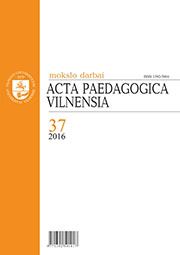Ugdymo turinio kaita Lietuvoje: globalizacijos padariniai
Curriculum Changes in Lithuania: The Consequences of Globalization
Author(s): Jogaila VaitekaitisSubject(s): School education, Higher Education , State/Government and Education, Methodology and research technology, Globalization
Published by: Vilniaus Universiteto Leidykla
Keywords: Curriculum; globalization; international comparative studies; the OECD PISA;
Summary/Abstract: The main goal of this article is to analyze the trends of general curriculum development in the context of international assessments. A brief review of international organizations and international researches affecting the curriculum is provided. This article in detail analyzes the Program for International Student Assessment (PISA), carried out by the Organization for Economic Cooperation and Development (OECD), with a triennial international survey, which is aimed to evaluate education systems worldwide by testing the skills and knowledge of 15-year-old students and the influence the program has on the education systems of foreign countries: Germany, Japan, and Denmark. In addition, this article analyzes the potential influence of the said survey on the general curriculum in Lithuania. The last part describes the methodological particularities of the empirical survey and performs the analysis of data collected during the semi-structured interviews of Įteikta 2016 05 08 Priimta 2016 05 20 experts. The participants of the survey are education experts, whose current activities and experience are related to the general curriculum and the factors affecting its changes. A deeper and critical part of the study consists of the conclusions, which, based on expert opinions, identify the impact of international surveys on the general curriculum of Lithuania. Changes observed in other countries that have suffered from the so called “PISA shock” can also be seen in the Lithuanian education system. The conclusions state that, as a result of international comparative surveys which focus on high scores in production-related subjects and skills, the general curriculum of Lithuania becomes narrower, thus undermining the educational notion of developing holistic social cohesion and prosperity for society. Taking this into account, rightful questions regarding the direction of Lithuanian education policy are raised.
Journal: Acta Paedagogica Vilnensia
- Issue Year: 2016
- Issue No: 37
- Page Range: 18-34
- Page Count: 17
- Language: Lithuanian

